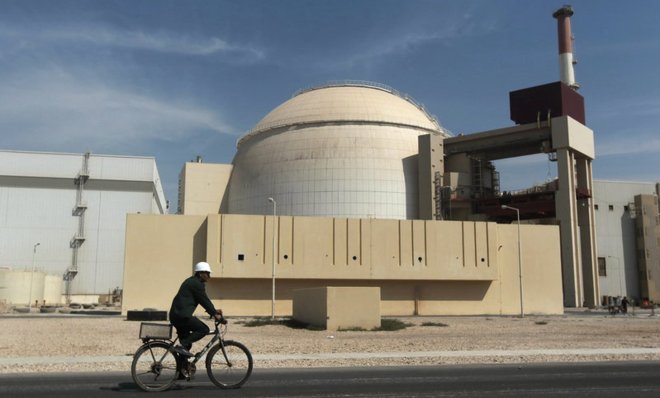Could the Iran nuclear deal actually work?
Iran and a group of world powers just finalized the agreement to freeze Iran's weapons-grade nuclear program... for now


A free daily email with the biggest news stories of the day – and the best features from TheWeek.com
You are now subscribed
Your newsletter sign-up was successful
On Sunday, Iran and the P5+1 group of world powers — the U.S., Britain, France, Russia, and China, plus Germany — finalized the details of an interim deal to curb and slightly roll back Iran's nuclear program. On January 20, International Atomic Energy Agency (IAEA) inspectors will start checking to make sure that Iran has, as agreed, started dismantling its stock of medium-grade uranium and frozen or reduced its number of active centrifuges.
"As of that day, for the first time in almost a decade, Iran's nuclear program will not be able to advance, and parts of it will be rolled back, while we start negotiating a comprehensive agreement to address the international community's concerns about Iran's program," U.S. Secretary of State John Kerry said on Sunday. In return, Iran will get an easing of sanctions. The text of the document detailing the agreement was not released on Sunday.
There's no real reason to believe the initial six-month deal will fall apart. Iran needs the money, and the up to $7 billion in sanctions relief will be doled out in monthly installments, based on verified compliance with the agreement. The U.S. and its allies, meanwhile, are getting inspections of Iran's facilities, a halt to Iran having weapons-grade uranium, and a longer warning period if Iran decides to weaponize its uranium stockpiles.
The Week
Escape your echo chamber. Get the facts behind the news, plus analysis from multiple perspectives.

Sign up for The Week's Free Newsletters
From our morning news briefing to a weekly Good News Newsletter, get the best of The Week delivered directly to your inbox.
From our morning news briefing to a weekly Good News Newsletter, get the best of The Week delivered directly to your inbox.
The entire deal is reversible at any time, though. The New York Times characterizes the agreement as "an elaborate pause button that provides a basis for pursuing a larger accord." Either size could press "play" at any time. And hawks in Iran and the U.S. aren't exactly rushing to embrace the deal.
To assuage the concerns of Iran's hard-liners, Deputy Foreign Minister Abbas Araghchi emphasized that the actions to lower the potency of the country's enriched uranium to no more than 5 percent was easily reversible. The connections between reactors that allow enrichment of 20 percent "can be removed in a day and connected again in a day," he said on Iranian TV. "Nuclear enrichment is our right."
In the U.S., at least 59 senators have signed on to a bipartisan bill that would tighten the sanctions against Iran. President Obama said Sunday that "imposing additional sanctions now will only risk derailing our efforts to resolve this issue peacefully, and I will veto any legislation enacting new sanctions during the negotiation." BuzzFeed's Rosie Gray reports that, according to a Senate aide, there are more than the 67 votes needed to overcome a veto. The House passed its version of the bill last summer.
Still, assuming neither Congress, Iranian hawks, nor a third party scuttles the interim deal, there's a decent chance we'll have six months of no movement toward an Iranian nuke, then maybe another six months if the deal is extended. But this agreement is only supposed to create space for a larger, more comprehensive deal to end Iran's nuclear weapons program. Obama said in his statement that he has "no illusions about how hard it will be to achieve this objective."
A free daily email with the biggest news stories of the day – and the best features from TheWeek.com
That's not just an attempt to lower expectations. It's relatively easy to hit pause, but really hard to press stop and then smash the stereo to pieces. When a country really wants to develop a nuclear weapon, and has the resources to devote to the endeavor, the international community has a poor track record of stopping the push. India and Pakistan both ignored international warnings, and North Korea has turned signing and then breaking deals into an art form.
Perhaps the only success story is Libya, but the Moammar Gadhafi regime wasn't very far along in its nuclear program when it gave up amid international pressure in 2003.
In November, Jon Terbush argued that success in Iran will be a nebulous thing to declare or define. At this point, the leaders of all the principal countries seem to be on board with bucking history and reaching a clear, mutually agreeable solution to the long-festering problem of Iran's nuclear program. We'll know how they're faring in six months or less.
Peter has worked as a news and culture writer and editor at The Week since the site's launch in 2008. He covers politics, world affairs, religion and cultural currents. His journalism career began as a copy editor at a financial newswire and has included editorial positions at The New York Times Magazine, Facts on File, and Oregon State University.
-
 Gwen John: Strange Beauties – a ‘superb’ retrospective
Gwen John: Strange Beauties – a ‘superb’ retrospectiveThe Week Recommends ‘Daunting’ show at the National Museum Cardiff plunges viewers into the Welsh artist’s ‘spiritual, austere existence’
-
 Should the EU and UK join Trump’s board of peace?
Should the EU and UK join Trump’s board of peace?Today's Big Question After rushing to praise the initiative European leaders are now alarmed
-
 Antonia Romeo and Whitehall’s women problem
Antonia Romeo and Whitehall’s women problemThe Explainer Before her appointment as cabinet secretary, commentators said hostile briefings and vetting concerns were evidence of ‘sexist, misogynistic culture’ in No. 10
